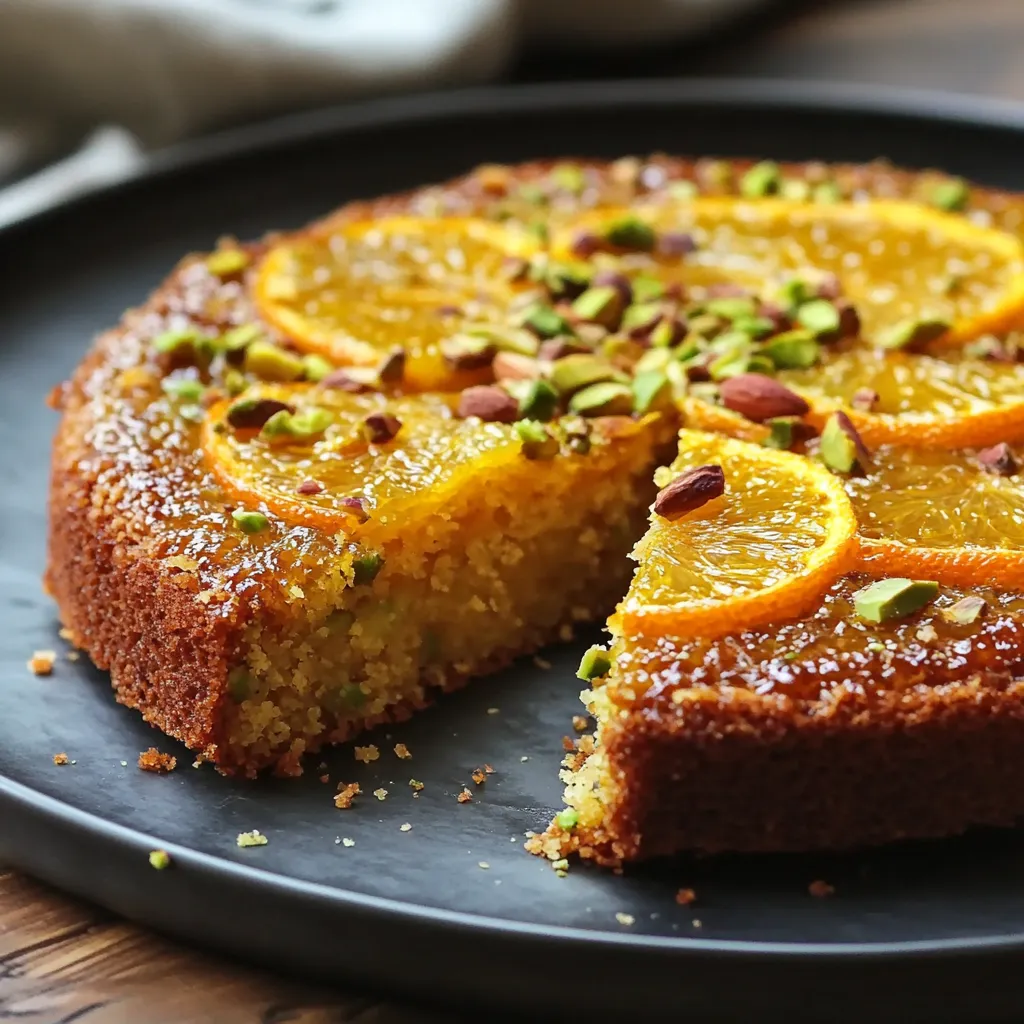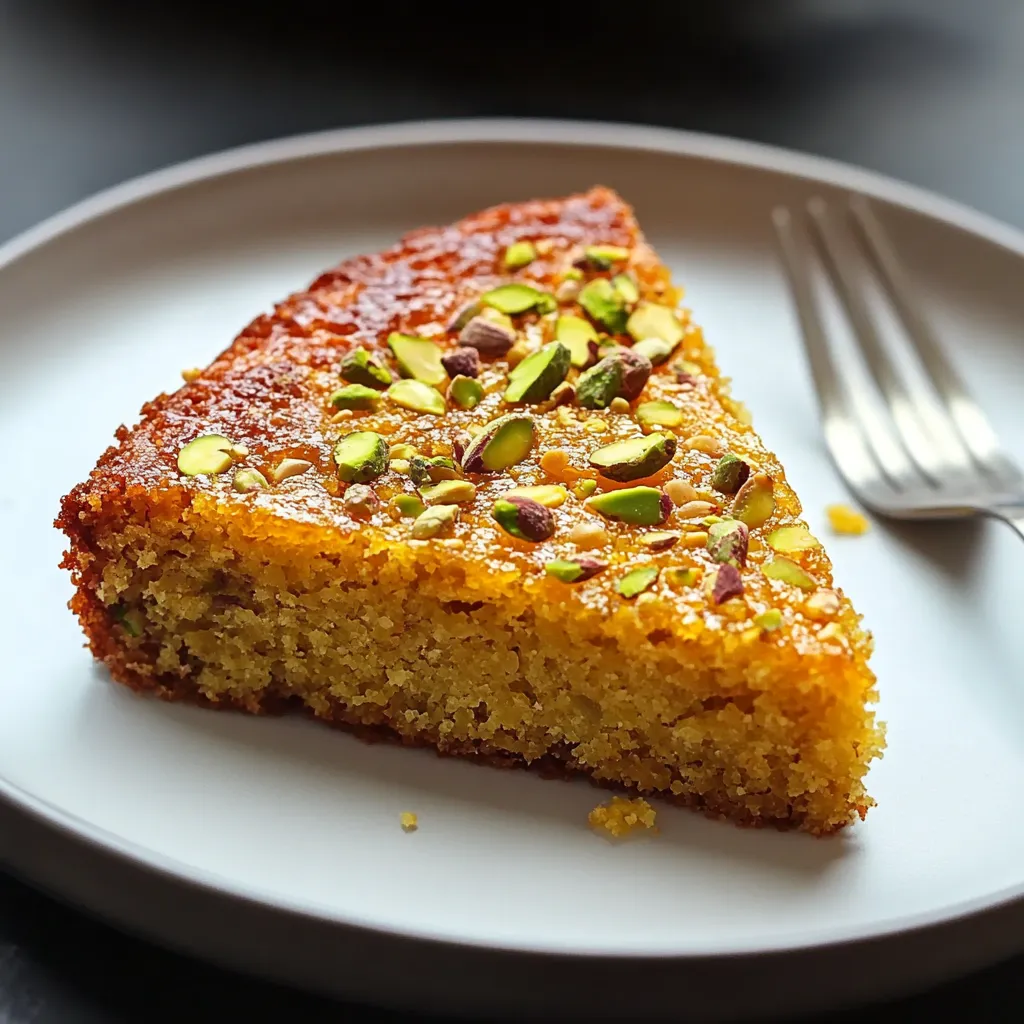 Pin it
Pin it
This flourless orange cake combines the bright flavor of whole oranges with the nutty richness of pistachios and almonds. The unique method of simmering whole oranges creates an incredibly moist texture while delivering intense citrus flavor in every bite.
I first created this cake for my celiac friend's birthday party, and it was such a hit that it's now my go-to dessert for gatherings where I need to accommodate various dietary needs without compromising on taste.
Ingredients
- Whole oranges: The star ingredient that provides moisture, flavor, and natural sweetness. Choose organic if possible as you'll be using the entire fruit
- Large eggs: Provide structure and binding for this flourless cake. Room temperature eggs incorporate better
- Honey: Offers a floral sweetness that pairs beautifully with the citrus. Use a light variety to complement rather than overpower
- Ground pistachios: Add a distinctive nutty flavor and gorgeous green flecks throughout the cake. Unsalted raw pistachios work best
- Almond flour: Creates the tender crumb and adds subtle nuttiness. Look for fine blanched almond flour for the best texture
- Vanilla extract: Enhances all the flavors. Pure vanilla extract makes a noticeable difference
- Baking soda: Provides just enough lift without making the cake too cakey. Fresh baking soda ensures proper rising
- Fresh orange juice: For the glaze intensifies the citrus flavor. Freshly squeezed yields the brightest taste
Step-by-Step Instructions
- Prepare the Oranges:
- Place whole unpeeled oranges in a pot and cover completely with water. Bring to a gentle simmer and cook for a full hour. This process removes bitterness from the peel and softens the entire fruit. The oranges should be very soft when pierced with a fork.
- Make the Orange Puree:
- Drain the cooked oranges thoroughly and let them cool for about 10 minutes until you can handle them. Cut them in quarters to release steam and check for seeds, removing any you find. Place the orange pieces including the peel in a blender or food processor and blend until completely smooth. The puree should have a vibrant orange color and silky consistency.
- Preheat and Prepare:
- Set your oven to 350°F. Prepare your springform pan by greasing it thoroughly, then line the bottom with parchment paper. The parchment ensures easy removal since this moist cake can tend to stick.
- Mix the Cake Batter:
- In a large mixing bowl, whisk the eggs until frothy, about 1 minute. Add the honey and continue whisking until well incorporated. Fold in the orange puree and vanilla extract. In a separate bowl, combine the ground pistachios, almond flour, and baking soda, then gradually fold into the wet ingredients until just combined. Overmixing can make the cake dense.
- Bake to Perfection:
- Pour the batter into your prepared pan and smooth the top with a spatula. Bake for 60 minutes, checking at the 45-minute mark. If the top is browning too quickly, cover loosely with aluminum foil. The cake is done when it has a deep golden color and a toothpick inserted in the center comes out with just a few moist crumbs.
- Create the Glaze:
- While the cake cools slightly, make the glaze by combining fresh orange juice and honey in a small saucepan. Bring to a gentle boil, then reduce heat and simmer for about 10 minutes until reduced by half and slightly thickened. The glaze should coat the back of a spoon.
- Finish with Finesse:
- When the cake has cooled for about 15 minutes, brush the warm glaze generously over the top, allowing it to soak in. Let the cake cool completely in the pan for at least 2 hours before releasing the springform sides. For the best flavor and texture, refrigerate overnight before serving.
 Pin it
Pin it
The boiling of whole oranges is the secret technique that transforms this cake. I discovered this method in a traditional Sephardic recipe book that belonged to my grandmother. She would make something similar during winter orange season, and the aroma would fill our house with the most comforting citrus scent.
Make It Your Own
This versatile cake can be adapted to your taste preferences and what you have on hand. Replace half the pistachios with walnuts for a different nutty profile, or swap the honey for maple syrup for a more complex sweetness. The recipe is quite forgiving with these substitutions while maintaining its moist, dense texture.
Serving Suggestions
Serve this cake at room temperature for the fullest flavor experience. A dollop of lightly whipped cream or thick Greek yogurt provides a creamy contrast to the intense citrus. For special occasions, add a scattering of fresh berries and a light dusting of powdered sugar just before serving.
Storage Tips
The cake will keep beautifully at room temperature for up to two days, covered with a cake dome or plastic wrap. For longer storage, refrigerate for up to a week. The flavors continue to develop, making this an excellent make ahead dessert. You can also freeze individual slices, well wrapped, for up to three months.
 Pin it
Pin it
This cake is a celebration of citrus and nuts that stands out at any occasion. Serve it proudly, and enjoy every bite!
Frequently Asked Questions
- → Can I substitute the pistachios with another nut?
Yes, you can substitute the ground pistachios with additional almond flour, or try hazelnuts or walnuts for a different flavor profile. Each nut will impart its own unique taste, but the texture will remain similar.
- → Why do the oranges need to be boiled?
Boiling the whole oranges softens the skin and removes bitterness, allowing you to use the entire fruit (peel and all) in the cake. This technique creates an intensely flavorful, moist cake with distinct orange notes.
- → How should I store this cake?
Store the cake in an airtight container at room temperature for up to 3 days, or refrigerate for up to a week. The flavors actually develop and improve after a day or two. You can also freeze slices for up to 3 months.
- → Is this cake suitable for diabetics?
While this cake doesn't contain refined sugar, it does contain honey, which will affect blood glucose levels. Diabetics might consider reducing the honey amount or consulting with their healthcare provider about appropriate portion sizes.
- → Can I make this cake without eggs?
This particular cake relies heavily on eggs for structure since it's flourless. Unfortunately, simple egg replacers like flax eggs won't provide the same results. For an egg-free version, you'd need to significantly modify the recipe with additional binding agents.
- → How do I know when the cake is fully baked?
Insert a toothpick into the center of the cake - it should come out clean or with a few moist crumbs, but not wet batter. Also, the cake should spring back slightly when gently pressed in the center. Due to the moist nature of this cake, it may remain somewhat dense compared to traditional cakes.
